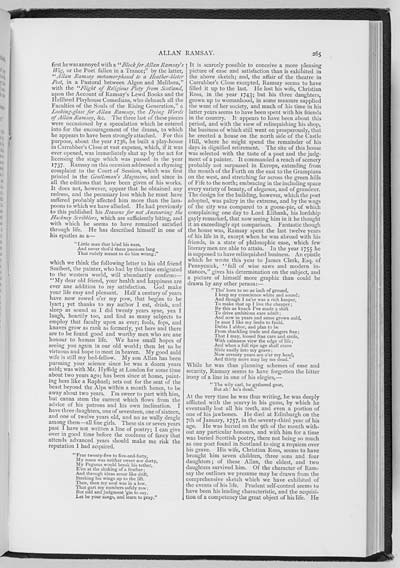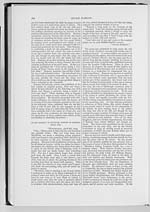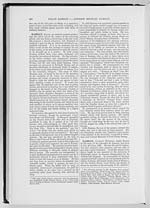265
first he was annoyed with a "Block for Allan Ramsay's
Wig, or the Poet fallen in a Trance;" by the latter,
"Allan Ramsay metamorphosed to a Heather-bloter
Poet, in a Pastoral between Algon and Melib�a,"
with the "Flight of Religious Piety from Scotland,
upon the Account of Ramsay's Lewd Books and the
Hellbred Playhouse Comedians, who debauch all the
Faculties of the Souls of the Rising Generation," a
Looking-glass for Allan Ramsay, the Dying Words
of Allan Ramsay, &c. The three last of these pieces
were occasioned by a speculation which he entered
into for the encouragement of the drama, to which
he appears to have been strongly attached. For this
purpose, about the year 1736, he built a play-house
in Carrubber's Close at vast expense, which, if it was
ever opened, was immediately shut up by the act for
licensing the stage which was passed in the year
1737. Ramsay on this occasion addressed a rhyming
complaint to the Court of Session, which was first
printed in the Gentleman's Magazine, and since in
all the editions that have been given of his works.
It does not, however, appear that he obtained any
redress, and the pecuniary loss which he must have
suffered probably affected him more than the lam-
poons to which we have alluded. He had previously
to this published his Reasons for not Answering the
Hackney Scribblers, which are sufficiently biting, and
with which he seems to have remained satisfied
through life. He has described himself in one of
his epistles as a�
'' Little man that lo'ed his ease,
And never thol'd these passions lang
That rudely meant to do him wrang;"
which we think the following letter to his old friend
Smibert, the painter, who had by this time emigrated
to the western world, will abundantly confirm:�
"My dear old friend, your health and happiness are
ever ane addition to my satisfaction. God make
your life easy and pleasant. Half a century of years
have now rowed o'er my pow, that begins to be
lyart; yet thanks to my author I eat, drink, and
sleep as sound as I did twenty years syne, yea I
laugh, heartily too, and find as many subjects to
employ that faculty upon as ever; fools, fops, and
knaves grow as rank as formerly, yet here and there
are to be found good and worthy men who are ane
honour to human life. We have small hopes of
seeing you again in our old world; then let us be
virtuous and hope to meet in heaven. My good auld
wife is still my bed-fellow. My son Allan has been
pursuing your science since he was a dozen years
auld; was with Mr. Hyffidg at London for some time
about two years ago; has been since at home, paint-
ing here like a Raphael; sets out for the seat of the
beast beyond the Alps within a month hence, to be
away about two years. I'm sweer to part with him,
but canna stem the current which flows from the
advice of his patrons and his own inclination. I
have three daughters, one of seventeen, one of sixteen,
and one of twelve years old, and no ae wally dragle
among them�all fine girls. These six or seven years
past I have not written a line of poetry; I can give
over in good time before the coolness of fancy that
attends advanced years should make me risk the
reputation I had acquired.
"Frae twenty-five to five-and-forty,
My muse was neither sweer nor dorty,
My Pegasus would break his tether,
E'en at the shaking of a feather;
And through ideas scour like drift,
Streking his wings up to the lift.
Then, then my soul was in a low,
That gart my numbers safely row;
But eild and judgment 'gin to say,
Let be your sangs, and learn to pray."
It is scarcely possible to conceive a more pleasing
picture of ease and satisfaction than is exhibited in
the above sketch; and, the affair of the theatre in
Carrubber's Close excepted, Ramsay seems to have
filled it up to the last. He lost his wife, Christian
Ross, in the year 1743; but his three daughters,
grown up to womanhood, in some measure supplied
the want of her society, and much of his time in his
latter years seems to have been spent with his friends
in the country. It appears to have been about this
period, and with the view of relinquishing his shop,
the business of which still went on prosperously, that
he erected a house on the north side of the Castle
Hill, where he might spend the remainder of his
days in dignified retirement. The site of this house
was selected with the taste of a poet and the judg-
ment of a painter. It commanded a reach of scenery
probably not surpassed in Europe, extending from
the mouth of the Forth on the east to the Grampians
on the west, and stretching far across the green hills
of Fife to the north; embracing in the including space
every variety of beauty, of elegance, and of grandeur.
The design for the building, however, which the poet
adopted, was paltry in the extreme, and by the wags
of the city was compared to a goose-pie, of which
complaining one day to Lord Elibank, his lordship
gayly remarked, that now seeing him in it he thought
it an exceedingly apt comparison. Fantastic though
the house was, Ramsay spent the last twelve years
of his life in it, except when he was abroad with his
friends, in a state of philosophic ease, which few
literary men are able to attain. In the year 1755 he
is supposed to have relinquished business. An epistle
which he wrote this year to James Clerk, Esq. of
Pennycuick, "full of wise saws and modern in-
stances," gives his determination on the subject, and
a picture of himself more graphic than could be
drawn by any other person:�
"Tho' born to no ae inch of ground,
I keep my conscience white and sound;
And though I ne'er was a rich keeper,
To make that up I live the cheaper;
By this ae knack I've made a shift
To drive ambitious care adrift;
And now in years and sense grown auld,
In ease I like my limbs to fauld.
Debts I abhor, and plan to be
From shackling trade and dangers free;
That I may, loosed frae care and strife,
With calmness view the edge of life;
And when a full ripe age shall crave
Slide easily into my grave;
Now seventy years are o'er my head,
And thirty more may lay me dead."
While he was thus planning schemes of ease and
security, Ramsay seems to have forgotten the bitter
irony of a line in one of his elegies,�
" The wily carl, he gathered gear,
But ah! he's dead."
At the very time he was thus writing, he was deeply
afflicted with the scurvy in his gums, by which he
eventually lost all his teeth, and even a portion of
one of his jawbones. He died at Edinburgh on the
7th of January, 1757, in the seventy-third year of his
age. He was buried on the 9th of the month with-
out any particular honours, and with him for a time
was buried Scottish poetry, there not being so much
as one poet found in Scotland to sing a requiem over
his grave. His wife, Christian Ross, seems to have
brought him seven children, three sons and four
daughters; of these Allan, the eldest, and two
daughters survived him. Of the character of Ram-
say the outlines we presume may be drawn from the
comprehensive sketch which we have exhibited of
the events of his life. Prudent self-control seems to
have been his leading characteristic, and the acquisi-
tion of a competency the great object of his life. He

![]() Universal Viewer |
Universal Viewer | ![]() Mirador |
Large image | Transcription
Mirador |
Large image | Transcription
![]()

